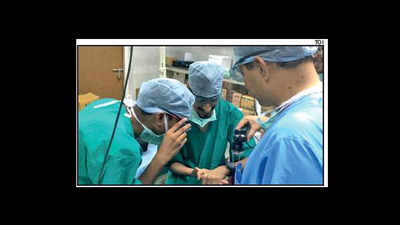- News
- City News
- lucknow News
- IITians wield the scalpel for surgical tech edge
Trending
This story is from May 19, 2018
IITians wield the scalpel for surgical tech edge
A handy, sophisticated device for an on-the-spot cervical cancer test.A semi-automatic device that makes liver biopsy simpler.

A team of of eight students from biological sciences and bioengineering department of IIT-K is at KGMU to interact with doctors.
LUCKNOW: A handy, sophisticated device for an on-the-spot cervical cancer test. A semi-automatic device that makes liver biopsy simpler. An improvised retractor that facilitates better view and access to delicate inner body parts during surgical procedures. Newer ways to check rejection of stem cells from the affected site.
These are some innovation ideas growing in KGMU-IIT Kanpur's biodesign programme.
A team of of eight students from biological sciences and bioengineering department of IIT-K is at KGMU to interact with doctors to find innovative solutions to complex problems.
"Precision means life in hospital wards and operation theatres," said Virender Singh, a PhD scholar at IIT-K working on a neurosurgical device project.
Two interns lived their medical college dreams in KGMU. Tarun Mascarenhas now feels he took the right decision in choosing engineering over medical science. "Its not easy to take this pressure. It's also difficult to cope with strenuous work schedules," remarked Tarun, while Akshay Shendre isn't so sure and slipped into a low initially.
Project coordinator at KGMU Prof Rishi Sethi said, "The students have listed 70 ideas. The list will be pruned. Finally, 10 ideas will be worked upon either to simplify medical procedures or make them cost-effective.
The KGMU-IITK project draws inspiration from the 'Stanford University-AIIMS-IIT-Delhi' collaborative programme launched in 2007. "Our's is an improvised version with targets and timelines to achieve patented innovations," said Prof Sethi.
Virender stated, "The interaction with doctors helped us understand what is achievable immediately and what can be done in the long term. The ideas will be translated into prototypes to put into practical usage test before finalisation."
These are some innovation ideas growing in KGMU-IIT Kanpur's biodesign programme.
A team of of eight students from biological sciences and bioengineering department of IIT-K is at KGMU to interact with doctors to find innovative solutions to complex problems.
"Precision means life in hospital wards and operation theatres," said Virender Singh, a PhD scholar at IIT-K working on a neurosurgical device project.
Adarsh Kumar, who decided to forgo admission in a medical college after a visit to Safdarjung Hospital's plastic surgery department, said, "I then felt that medical profession could be depressing. But now realised that seeing patients smile after long surgeries is indescribable," he said.
Two interns lived their medical college dreams in KGMU. Tarun Mascarenhas now feels he took the right decision in choosing engineering over medical science. "Its not easy to take this pressure. It's also difficult to cope with strenuous work schedules," remarked Tarun, while Akshay Shendre isn't so sure and slipped into a low initially.
Project coordinator at KGMU Prof Rishi Sethi said, "The students have listed 70 ideas. The list will be pruned. Finally, 10 ideas will be worked upon either to simplify medical procedures or make them cost-effective.
The KGMU-IITK project draws inspiration from the 'Stanford University-AIIMS-IIT-Delhi' collaborative programme launched in 2007. "Our's is an improvised version with targets and timelines to achieve patented innovations," said Prof Sethi.
Virender stated, "The interaction with doctors helped us understand what is achievable immediately and what can be done in the long term. The ideas will be translated into prototypes to put into practical usage test before finalisation."
End of Article
FOLLOW US ON SOCIAL MEDIA











